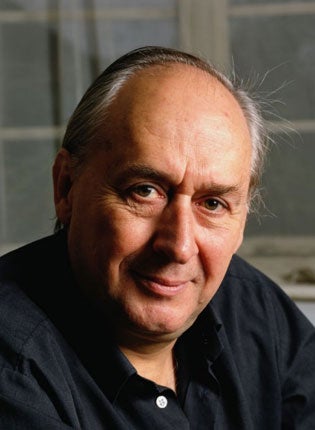J G Ballard dies, aged 78, after long illness

Your support helps us to tell the story
From reproductive rights to climate change to Big Tech, The Independent is on the ground when the story is developing. Whether it's investigating the financials of Elon Musk's pro-Trump PAC or producing our latest documentary, 'The A Word', which shines a light on the American women fighting for reproductive rights, we know how important it is to parse out the facts from the messaging.
At such a critical moment in US history, we need reporters on the ground. Your donation allows us to keep sending journalists to speak to both sides of the story.
The Independent is trusted by Americans across the entire political spectrum. And unlike many other quality news outlets, we choose not to lock Americans out of our reporting and analysis with paywalls. We believe quality journalism should be available to everyone, paid for by those who can afford it.
Your support makes all the difference.J G Ballard, the award-winning writer best known for his autobiographical novel Empire of the Sun, has died at his home in Shepperton, aged 78, after a long illness. He had been unwell "for several years", said his agent, Margaret Hanbury. He had prostate cancer.
"J G Ballard has been a giant on the world literary scene for more than 50 years," said Ms Hanbury, who was his agent for 25 of them. "His acute and visionary observation of contemporary life was distilled into a number of brilliant, powerful novels which have been published all over the world and saw Ballard gain cult status."
James Graham Ballard was regularly labelled a writer of science fiction, but maintained he was "picturing the psychology of the future". He earned the rare distinction of appearing as an adjective – "Ballardian" – in the Collins English Dictionary, referring to "dystopian modernity, bleak man-made landscapes and the psychological effects of technological, social or environmental developments".
He was frequently controversial, expressing respect for Margaret Thatcher and her "Americanisation" of British life in the 1980s. He later targeted "eco-puritans", and said pornography was "a powerful catalyst for social change". His literary career began in 1962 with the publication of The Drowned World, and although derided by some science fiction fans for ignoring many conventions of the genre, he garnered a cult following. His works include High Rise, Cocaine Nights and Super-Cannes. He became known to a younger generation through David Cronenberg's 1996 film of his 1973 novel Crash, in which the protagonists engineer car accidents for sexual kicks.
Ballard was born in 1930 into the privileged British expatriate community in Shanghai. In 1943, he and his parents were interned by the Japanese in the Lunghua detention camp, where, he wrote in his memoirs, he was "largely happy" and found it a "relaxed and easygoing world" in which he thrived, "even when food rations fell to near zero, skin infections covered my legs, malnutrition had prolapsed my rectum, and many of the adults had lost heart".
He found mainstream success with Empire of the Sun, a ficionalised account of those experiences, published in 1984 and shortlisted for the Booker prize. Steven Spielberg's film version was nominated for six Oscars. Ballard wrote: "In many ways, my entire fiction is the dissection of a deep pathology that I had witnessed in Shanghai and later in the postwar world."
Released from internment in 1945, Ballard found himself in boarding school in England and went on to study medicine at King's College, Cambridge. He later became an RAF pilot, then an advertising agency copywriter, encyclopedia salesman and assistant editor of scientific journal Chemistry and Industry.
He married and began writing short stories in the mid-1950s, heavily influenced by surrealism and psychoanalysis. From a bedsit in Notting Hill, the couple moved to the west London suburb of Shepperton and had three children. But in 1964, his wife, Mary, died of pneumonia during a holiday in Spain.
Join our commenting forum
Join thought-provoking conversations, follow other Independent readers and see their replies
Comments